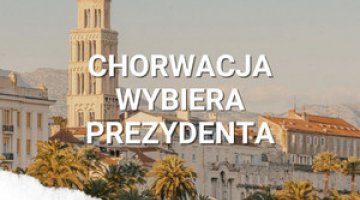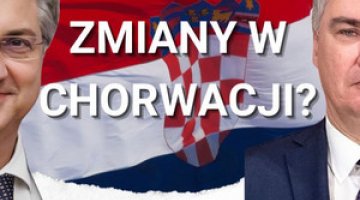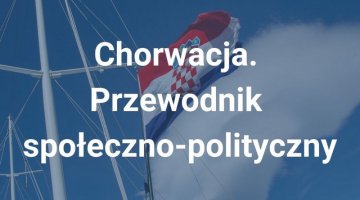Presidential election in Croatia: Milanović is re-elected
On 12 January, Zoran Milanović won the second round of the presidential election in Croatia, securing 74.7% of the vote. His opponent, Dragan Primorac, supported by the ruling centre-right Croatian Democratic Union (HDZ), received 25.3% of the vote. Voter turnout was 44.2%, nearly 11 percentage points lower than in the 2020 presidential run-off.
Milanović’s success is primarily the result of his personal popularity. He enjoys the trust of both supporters of left-wing parties, which form his political background, and a portion of right-wing voters, whose support he has gained through the use of nationalist and sovereigntist rhetoric. His presidency will likely feature sharp disputes with the right-wing government and weaken the coherence of Croatia’s foreign policy, as Milanović is sceptical about aiding Ukraine.
Commentary
- Milanović’s re-election is a personal success, as he came close to winning the first round of the election, receiving 49% of the vote. During his first term, he was consistently Croatia’s highest-rated politician. The scale of his popularity is corroborated by his victory across all Croatian županias (equivalent to regions). Milanović has his roots in the Social Democratic Party of Croatia (SDP), focusing his campaign on criticism of the HDZ government, primarily targeting Prime Minister Andrej Plenković, and pledging to combat corruption while promoting greater independence from Brussels and Washington. Milanović’s strong result was also aided by the HDZ’s decision to endorse a less charismatic candidate, whose level of support in the election proved to be considerably smaller than that historically enjoyed by the party. The HDZ came first in the 2024 parliamentary election (see ‘Croatia: Plenković’s third government, and a turn to the right’). The potential nomination of a more popular candidate was likely not in Prime Minister Plenković’s interest, as he has long ensured that no prominent rival emerges within his party’s ranks. Meanwhile, the recent major defeat suffered by the HDZ candidate could weaken the party’s position in the upcoming local elections scheduled for May.
- Milanović’s second term marks a continuation of the strained cohabitation between the president and the prime minister. Consequently, it is likely to significantly jeopardise the coherence of Zagreb’s foreign policy. According to the Croatian constitution, responsibility for foreign and defence policy lies with the government, albeit with an obligation to cooperate with the president. In practice, this requires the government to collaborate with the head of state on matters such as appointing the head of secret services, ambassadors, and deciding on the participation of Croatian troops in foreign missions. Due to the conflict between Plenković and Milanović, several key diplomatic posts remain vacant, and no agreement has been reached regarding Croatia’s involvement in support missions for Ukraine, such as EUMAM and NSATU. Furthermore, threats issued by Milanović in 2022, regarding his intention to block NATO enlargement to include Finland and Sweden, undermined Croatia’s credibility among its allies.
- Milanović is a vocal critic of military support for Ukraine. The Croatian president argues that arming Kyiv could further provoke Russia and contends that Croatia should loosen its ties with the warring sides (see ‘Chorwacja wobec konfliktu Ukraina–Rosja: fronda prezydenta Milanovicia’). By distancing himself from the government’s pro-Ukrainian stance, Milanović seeks to position himself as a defender of national interests, aiming to prevent Croatia from being drawn into the war with Russia. This approach resonates with a portion of the public, which believes that it is in Croatia’s interest to pursue a policy of balance and to avoid antagonising nuclear-armed Russia. The Kremlin’s propaganda has repeatedly cited Milanović’s statements, using his words to legitimise its narratives about NATO’s provocations, as well as the West’s weakness and disunity.
APPENDIX
A profile of Croatia’s president
Zoran Milanović (b. 1966) comes from a family with political traditions rooted in the Yugoslav Partisans movement led by Josip Broz Tito and the League of Communists of Yugoslavia. He studied law at the University of Zagreb and European law at the University of Brussels. He worked at the Commercial Court and later at the Ministry of Foreign Affairs. In 1994, he served as a member of the OSCE observer mission in Nagorno-Karabakh, and from 1996, he collaborated with Croatia’s diplomatic mission to NATO and the EU. In 1999, he joined the Social Democratic Party of Croatia (SDP), and in 2004, he became a member of its leadership.
In 2007, he was elected leader of the Social Democratic Party (SDP), and in 2011, he led a coalition of left-wing parties that won a parliamentary election, after which he was appointed Croatia’s prime minister. During his term, Croatia joined the European Union and faced significant challenges, including the economic crisis (2009–14) and the migration crisis in 2015. His government focused on EU integration and subsequently on efforts to align the country with the European political mainstream. He was also one of the initiators of Croatia’s more active policy towards Bosnia and Herzegovina, particularly in defending the interests of Croats living there. Additionally, his cabinet maintained favourable relations with the United States.
After losing power, Milanović withdrew from politics and ventured into business by founding a consulting firm. In 2017, his firm provided services linked to the EU accession process; for instance, it advised Albania’s Prime Minister Edi Rama. In 2019, Milanović announced his decision to run in the presidential election with the backing of the SDP and other left-wing parties. A year later, he won the presidential run-off, defeating the Christian Democratic candidate Kolinda Grabar-Kitarović. His first term was marked by disputes with Prime Minister Andrej Plenković over their respective scopes of competence and by controversial statements on the Russian-Ukrainian war, which sparked controversy both domestically and internationally. In March 2024, Milanović announced his intention to run in the parliamentary election despite still holding the office of president. However, the Constitutional Court ruled that his candidacy would be illegal. Consequently, the president merely ‘endorsed’ a coalition of left-wing parties, which ultimately placed second.




